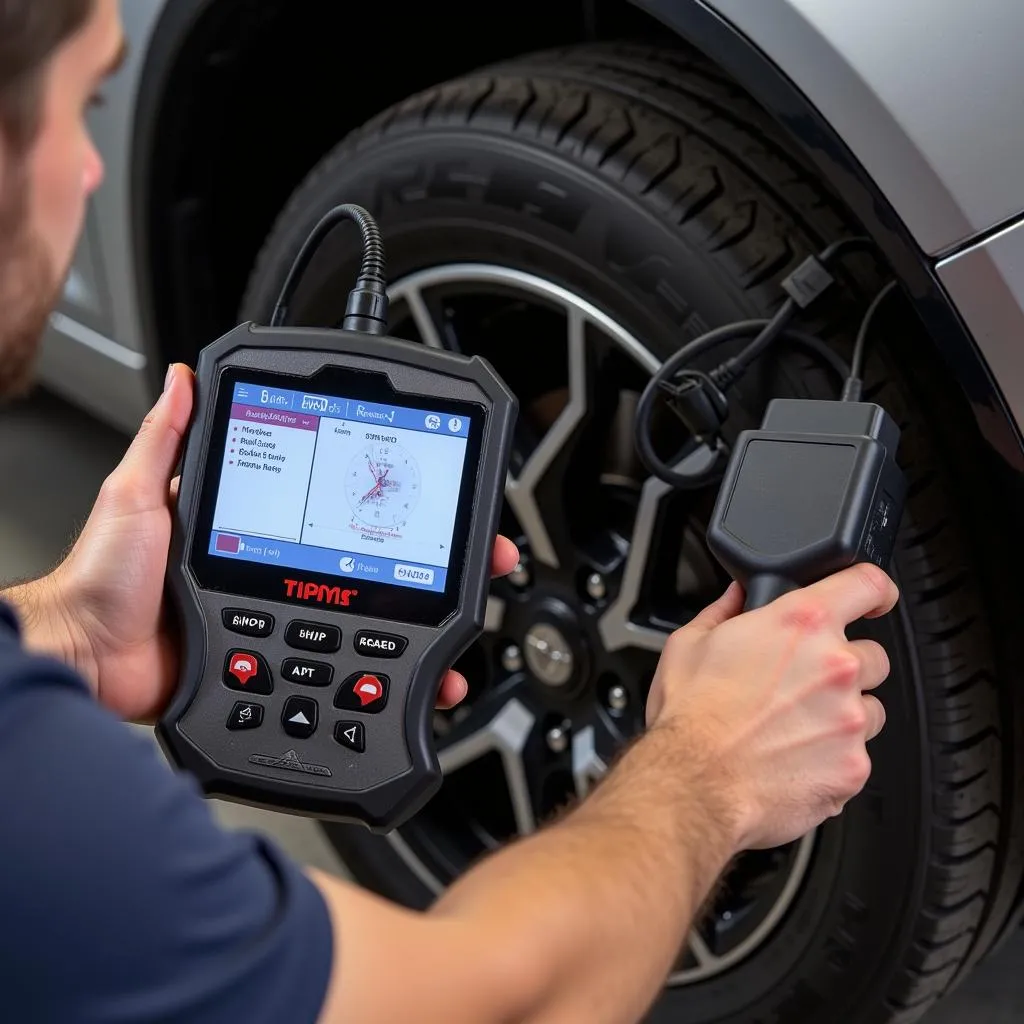The TPMS, or Tire Pressure Monitoring System, is an essential safety feature in modern vehicles. It alerts drivers to low tire pressure, helping to prevent accidents and improve fuel efficiency. At the heart of this system lies the TPMS sensor, responsible for measuring tire pressure and transmitting data to the vehicle’s computer. When it’s time to replace or service these sensors, a TPMS programmer becomes an indispensable tool. This guide delves into the world of TPMS programmers, exploring their functions, types, and the benefits they offer.
Understanding the TPMS and its Importance
The TPMS is designed to provide real-time information about your tires’ air pressure. Properly inflated tires are crucial for several reasons:
- Safety: Underinflated tires can overheat, increasing the risk of blowouts, especially at high speeds.
- Fuel Efficiency: Tires with low pressure create more rolling resistance, forcing your engine to work harder and consume more fuel.
- Tire Longevity: Driving on underinflated tires leads to uneven wear and tear, shortening their lifespan.
- Handling: Correct tire pressure ensures optimal vehicle handling and braking performance.
By alerting you to pressure drops, the TPMS system helps mitigate these risks.
The Role of a TPMS Programmer
A TPMS programmer is an electronic device that communicates with your vehicle’s TPMS system. It performs various functions, including:
- Reading Sensor Data: The programmer retrieves information from TPMS sensors, including pressure readings, temperature, battery status, and sensor ID.
- Programming Sensors: When replacing sensors, a programmer is used to configure new or cloned sensors to match your vehicle’s ECU (Electronic Control Unit).
- Triggering Sensors: Some programmers can activate the sensors to force a signal transmission, aiding in sensor location and system diagnostics.
- TPMS Relearn: After replacing sensors or rotating tires, a TPMS relearn procedure is often required. The programmer helps initiate this process, allowing the vehicle to recognize the new sensor positions.
Types of TPMS Programmers
TPMS programmers are available in various formats to cater to different needs:
- Handheld Programmers: Portable and user-friendly, these are suitable for DIY enthusiasts and small workshops.
- Professional TPMS Tools: Offering advanced features, comprehensive vehicle coverage, and regular software updates, these are ideal for professional mechanics and dealerships.
- OBD-II Programmers: These connect to your vehicle’s OBD-II port and often integrate with other diagnostic functions.
Benefits of Using a TPMS Programmer
- Accurate Diagnostics: Pinpoint TPMS issues with precision, saving time and guesswork.
- Efficient Sensor Replacement: Program new sensors quickly and accurately.
- Enhanced Safety: Ensure your TPMS is functioning correctly, promoting safer driving conditions.
- Cost Savings: Avoid unnecessary sensor replacements by accurately diagnosing problems.
- DIY Empowerment: Take control of your vehicle maintenance with user-friendly handheld programmers.
Choosing the Right TPMS Programmer
Selecting the right TPMS programmer depends on your specific needs and budget:
- Frequency of Use: Occasional users might find handheld programmers sufficient, while professionals require the versatility of professional-grade tools.
- Vehicle Coverage: Ensure the programmer supports your vehicle make and model.
- Features: Consider the functions that are important to you, such as OBD-II connectivity or advanced programming capabilities.
- Budget: Programmers range in price, so determine what features justify the cost for your needs.
Conclusion
A TPMS programmer is a valuable tool for anyone who values safety and vehicle maintenance. By understanding its functions and benefits, you can make an informed decision about whether a TPMS programmer is right for you. Whether you’re a DIY enthusiast or a professional mechanic, having the right tools ensures your TPMS operates flawlessly, keeping you safe and your vehicle running smoothly.
FAQs about TPMS Programmers
1. Do I need a TPMS programmer to check my tire pressure?
No, you can check your tire pressure with a standard tire pressure gauge. A TPMS programmer is used for more advanced tasks like programming new sensors.
2. How often do TPMS sensors need to be replaced?
TPMS sensors have batteries with an expected lifespan of 5-10 years. They should be replaced when the battery dies or if the sensor malfunctions.
3. Can I program TPMS sensors myself?
Yes, many handheld TPMS sensor programmers are designed for DIY use.
4. Are TPMS programmers universal?
Not all TPMS programmers are compatible with all vehicles. Ensure the programmer you choose supports your specific make and model.
5. What is a TPMS relearn procedure?
A TPMS relearn procedure is necessary after replacing sensors or rotating tires to help the vehicle’s ECU recognize the new sensor positions.
Common TPMS Programmer Questions and Situations
Scenario 1: You’ve recently replaced a tire and now your TPMS light is on.
In this situation, you’ll likely need to perform a TPMS relearn. A TPMS programer can initiate this process and get your TPMS light to turn off.
Scenario 2: You need to replace a faulty TPMS sensor.
A programmer is essential for programming a new TPMS sensor programmer to match your vehicle.
Scenario 3: You’re experiencing intermittent TPMS warnings and suspect a sensor issue.
An OBD programer with TPMS functionality can help diagnose sensor problems and read sensor data to identify the faulty unit.
For further information on TPMS systems, sensors, and programmers, explore our other articles on tire sensor programmers.
Need assistance with TPMS programming or have more questions? Contact us via WhatsApp: +1(641)206-8880, Email: cardiagtechworkshop@gmail.com or visit us at 276 Reock St, City of Orange, NJ 07050, United States. Our dedicated customer support team is available 24/7 to assist you.



